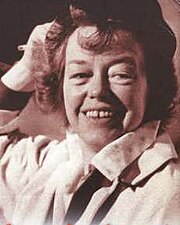 |
| Joan Littlewood |
Seminars about sustainability and the arts often, usefully but repeatedly, focus on energy use and material consumption. A public conversation at the Edinburgh Festival Fringe, ‘What’s the Big Idea?’, organised by Creative Carbon Scotland and Festivals Edinburgh, nodded to the material imperatives - the plastic cups - then shifted the discussion to the processes of making theatre that don’t fit with the accountancy of sustainability, to the unintended consequences of sustainable decisions, and to the need for sharing more technologies more widely.
The conversation opened with provocations from Erica Whyman,
Artistic Director of Northern Stage, and Anthony Alderson, Director of the
Pleasance Theatre Trust, chaired by Harry Giles, Environment Officer of
Festival Edinburgh, and hosted by Ben Twist of Creative Carbon Scotland
A phrase from Whyman recurred throughout the discussion. She
quoted theatre director Joan Littlewood speaking about how to make theatre, and how to challenge
the hierarchies in power: ‘We must get lost if we are to make a new route.’
Whyman compared ‘getting lost’ to the need in theatre
production for not adhering to absolute objectives, whether financial, material
or ideological. The question, for Whyman, is not why more artists don’t make
work about climate change. Artists make the work they want to make; they are
not essayists or teachers. Rather, artists get lost, and create something that
surprises.
The surprises, or unintended consequences of working within
financial constraints have meant theatres having to work with different
economic models. Whyman’s example was Northern Stage’s decision to group
together artists, makers and staff in accommodation in Edinburgh
Alderton spoke of the need to look for the wider questions
behind the requests for the artistic community to recycle or use less
energy. Every company working with the Pleasance plants a tree in Scotland
‘Getting lost’ figured in many of the audience’s questions.
If theatre productions set the conditions for the audience to get lost in
finding a new route, and organisations set the conditions for productions, how
do directors and curators more immediately set the conditions for artists to
‘get lost’ in creating new work about sustainability or the climate? Why might
artists not be willing to engage with, get lost, in the scientific and the
political aspects of climate change? How can artists be encouraged to hold
contradictory ideas in tension in creative ways, like the tension between where
we are now, and where we could be heading?
Too, there were questions about the relation between theatre
and the public; about whether theatre should teach; about audiences’
carbon footprints and whether the arts world had responsibility for audiences' travel.
The slight change of perspective connected the achievement of carbon reduction figures to the relations and effects between material use and communal, artistic and intellectual change - a viable new route.
The slight change of perspective connected the achievement of carbon reduction figures to the relations and effects between material use and communal, artistic and intellectual change - a viable new route.










No comments:
Post a Comment